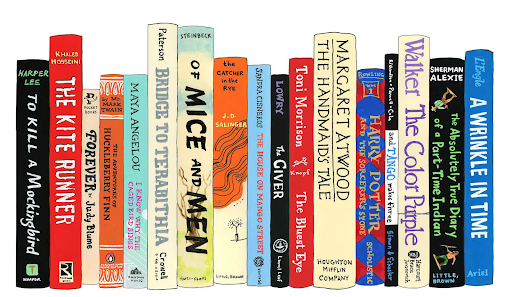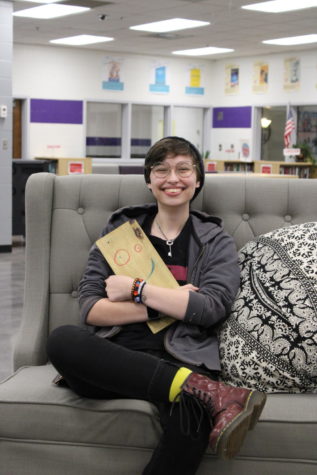The Danger of Banning Books

An illustration of books banned multiple times in schools. Photo by Jane Mount.
With a new wave of book bans, everyone has eyes on the school boards and officials about whether it is entirely fair. Books should be available to everyone. Banning books does nothing but hide history and the truth about the past. Nothing good ever comes from banning books. If we hide history, we will never learn from our past mistakes. Censorship is a dangerous, dangerous thing. Most of the banned books are about gender, sexuality, race and antisemitism, so what is the pattern? Topics that parents do not want to talk about.
Let us start with “Maus.” It shows the author, Art Spiegelman, interviewing his father about the Holocaust. It depicts Jewish people as mice and Nazis as cats. “Maus” was banned for nudity and language. Nudity of mice and language students have heard in the school hallways and language they likely already use. “Maus” uses a total of eight swear words in the book. So what is the fear? Fear of mice? Fear of profanity? Or fear that you might have to explain to your children that you do not like Jewish people and that you are the villains in history? Not talking about the Holocaust is a dangerous game to play. History will repeat itself, and you can not let something like the Holocaust get wiped away by hiding books. Yeah, the book is disturbing, and it should be. So that people remember what happened to all six million Jewish people who died.
Another banned book was “The Hate U Give” by Angie Thomas. This book is about a girl who witnesses her friend get murdered by the police and uses her voice to stand up and stand up for what is right. The book was banned in a Texas school district in 2017 for language and talks of racism and police brutality while leaning towards an anti-police message. Language, maybe. But to ban or challenge a book because of racism and police brutality is just ridiculous. You, as the reader, have the privilege to not read it on your own. But for some people, it is a reality, and they have to live it. To hide the truth in people’s lives by banning this book, acting as if it does not happen, is to diminish anyone who has lost their lives to police brutality. To hide the truth is to raise a new generation of ignorant children. To hide the truth from people is to say, ‘I do not live it, so why should I care?’
And do not get me started on the irony of Ray Bradbury’s “Fahrenheit 451” being banned and challenged. In 2007, a Texas school district and multiple libraries challenged the book. Do not get me wrong, when I had to read “Fahrenheit 451” in my ninth-grade lit class, I did not like it. Not because of what it contained, but because it just was not my favorite. But that does not mean I would want it banned. It was challenged for language, sex, abortion and suicide. When people read this book, they mostly read it in high school. If you are not mature enough to read about light mentions of sex and language, then you should not be in high school. “Fahrenheit 451” warns us about the future, and people know it. It shows us the dangers of censorship and hiding the past, and we still choose to ignore it.
In the end, the banning and censorship of books borders on the unethical. Actor and performer Paul Baverstock once said, “What they have to say is important! You might not agree with all of it, but you should still hear it and make up your own minds!” And he is right. Even if you disagree with what books have to say or what they contain, you should at least let your children and the next generation decide for themselves. If we do not learn from the past, we do not learn at all. That is why we know not to touch stoves; we did once and never did it again because we learned from the past. So, keep reading and do not be afraid to confront heavy topics.

Hiya, I’m Kai. This is my fourth and final year of Journalism. I like playing video games, my favorites being Bioshock and Not for Broadcast. I have...

